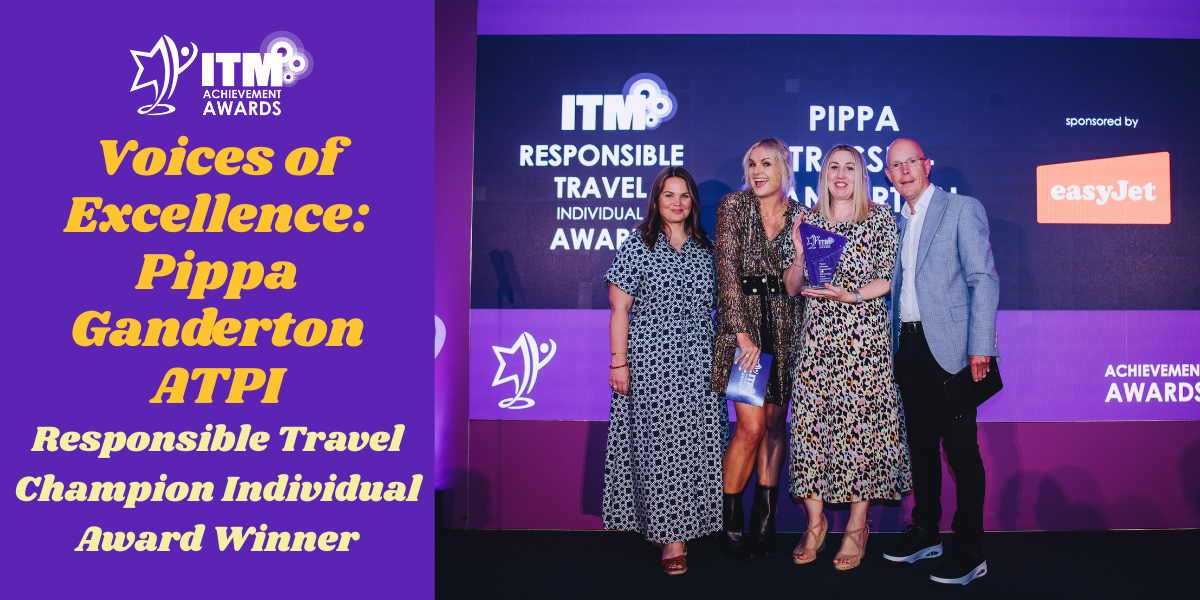Voices of Excellence: Pippa Ganderton

Responsible Travel Champion – Individual Award Winner – ATPI
What does it mean to be recognised as the Responsible Travel Champion?
It is a great honour to be named ITM’s Responsible Travel Champion. I love my job because it enables me to combine my passion for sustainability with work. Helping clients — as well as ATPI — make a difference is truly rewarding. I don’t seek this kind of recognition, so to be named an Achievement Award winner makes me very proud and motivates me to continue evolving our ATPI Halo programme and engaging with clients, internal stakeholders, and industry bodies alike.
I know that all the finalists were deserving, and each of their contributions is admirable, which makes this even more special.
Your work has spanned emissions strategy and global partnerships — what’s been most rewarding in your sustainability journey?
I would say that bringing clients on board with our ATPI Halo programme — whether that’s enhanced emissions reporting, compensating for emissions through the purchase of carbon credits, reducing emissions through investment in sustainable aviation fuel, or a combination of these — is the most rewarding part of my role.
Every time a client makes such a decision, they are taking a conscious step toward protecting our planet from climate change. We’ve built a base of repeat clients with ATPI Halo, and seeing these responsible initiatives become embedded in their Net Zero and sustainability strategies is what makes this work so meaningful.
How do you bring clients and internal stakeholders along when pushing for greener choices?
It’s important to be able to tell a story, and not just see things in isolation. Reporting and data are the first step — they raise awareness of a client’s travel-related emissions footprint and help with planning how to reduce it moving forward. Impact reports provide important context, as do scenario models that recommend smarter travel options, supplier choices, and the resulting emissions savings.
I often talk about investment in SAF or offsetting unavoidable emissions as the next step. We’re fortunate to have clients who act as referrals, because they’ve seen the tangible benefits of the products and services they’ve adopted through ATPI Halo.
It may sound simple, but it’s also critical to have the right people involved in the conversation. Sustainability may sit centrally within a dedicated team, procurement, or another department. Having these stakeholders in the room — along with those responsible for travel policy and management — can make all the difference when it comes to driving decisions.
You’re currently on the ground in Tanzania — how has that experience shaped your perspective on responsible travel?
Experiencing these projects firsthand has given me a unique perspective on the real-world impact of carbon finance. I’m very conscious of my own travel footprint, especially when visiting projects like Carbon Tanzania’s Ntakata in remote areas. Where possible, I opt for responsible travel options and will be assessing the emissions footprint of this trip and compensating for it.
While visiting the National Park for chimpanzee trekking — after spending time in the field with the Ntakata project developers in the Katavi region — I stayed at a camp that goes above and beyond: no single-use plastics, meals featuring local and seasonal produce, no air-conditioning, solar-powered hot water, and more.
The purpose of this trip was to experience what well-managed carbon finance projects look like. Most of our clients will never experience anything like this — these trips are difficult to organise and undertake. That’s why they value that I can report first-hand on the benefits their carbon investments are driving in poor and remote communities, and in the forests and mangroves they rely on. These ecosystems are critical not just to local livelihoods, but to global carbon sequestration.
If you could take a trip anywhere in the world – with no limits on budget or agenda – where would you go and why?
This is such a difficult question! My gut instinct — having just returned from Tanzania — would be to go chimp trekking in Mahale National Park, staying at the truly inspiring Nomad Greystoke camp.
However, for my own wellbeing (mind and body), I’d love to take an extended trip to Austria — trekking in the Alps and cycling around the lakes, staying in one of the many “bio” hotels. These places focus on sustainability, offer spa treatments, and usually serve amazingly delicious local and seasonal food and drink.
Discover all of our winners and browse the event images.



